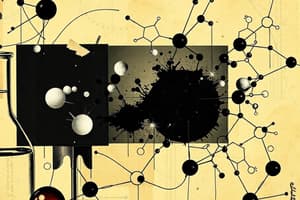Podcast
Questions and Answers
What is the primary reason for needing organic synthesis?
What is the primary reason for needing organic synthesis?
- To eliminate all isomers formed during reactions
- To convert starting materials into a target compound (correct)
- To reduce the cost of chemical production
- To increase the number of reaction steps in synthesis
Which of the following factors is NOT considered when designing a synthetic pathway?
Which of the following factors is NOT considered when designing a synthetic pathway?
- Product yield
- Reaction time (correct)
- Cost
- Hazards with reagents
How can the yield of a synthetic step be decreased?
How can the yield of a synthetic step be decreased?
- By leaving product in the reaction mixture (correct)
- By adding excess reagents
- By ensuring the reaction mixture is completely purified
- By increasing the temperature of the reaction
What is a crucial feature of the best synthetic pathways?
What is a crucial feature of the best synthetic pathways?
Which reagent is described as an oxidising agent in organic synthesis?
Which reagent is described as an oxidising agent in organic synthesis?
What problem does a chemist face when producing a racemic mixture?
What problem does a chemist face when producing a racemic mixture?
What is the impact of using an irreversible reaction in a synthesis pathway?
What is the impact of using an irreversible reaction in a synthesis pathway?
What is one of the main considerations for maximizing product yield?
What is one of the main considerations for maximizing product yield?
What is the purpose of using an excess of alcohol in the oxidation of aldehydes?
What is the purpose of using an excess of alcohol in the oxidation of aldehydes?
Which reducing agent can reduce a carbonyl group (C=O) to an alcohol group (C-OH)?
Which reducing agent can reduce a carbonyl group (C=O) to an alcohol group (C-OH)?
What is a dehydrating agent's role in organic synthesis?
What is a dehydrating agent's role in organic synthesis?
Which of the following is NOT a key reaction in aromatic synthesis?
Which of the following is NOT a key reaction in aromatic synthesis?
In organic synthesis, what does an organic synthesis map help illustrate?
In organic synthesis, what does an organic synthesis map help illustrate?
What is the effect of heating a reaction mixture under reflux in the context of aldehyde oxidation?
What is the effect of heating a reaction mixture under reflux in the context of aldehyde oxidation?
Which of the following is a conversion of nitrobenzene to an aromatic amine?
Which of the following is a conversion of nitrobenzene to an aromatic amine?
Which catalyst is associated with the reduction of a C=C double bond?
Which catalyst is associated with the reduction of a C=C double bond?
Study Notes
Organic Synthesis
- Organic synthesis is the creation of new molecules by converting starting materials into a desired compound
- Synthetic pathways can be multi-step and involve functional group oxidation, chain lengthening, and bond saturation
- Key considerations for designing a synthesis pathway:
- Product yield - related to Le Chatelier's principle
- Reaction conditions - temperature, pressure, solvent
- Catalyst requirement
- Reagents - specific chemicals
- Process - batch or continuous (consider purification steps)
- Hazards associated with reagents and conditions
- Cost - economically viable
- Isomer formation - enantiomers, stereospecificity of enzymes
- Reactivity of functional groups
Maximising Yield
- Maximizing yield is crucial for efficient and profitable synthesis
- Minimizing the number of steps in a pathway helps increase the overall yield
- Low yield in individual steps can occur due to:
- Product remaining in the reaction mixture
- Incomplete or irreversible reactions
Key Reagents
-
Oxidising agent - Acidified potassium dichromate
- Oxidises primary alcohols to aldehydes, then to carboxylic acids
- To stop at aldehyde, use excess alcohol and distill aldehyde
- Oxidises secondary alcohols to ketones
- Oxidises primary alcohols to aldehydes, then to carboxylic acids
-
Reducing agents
- NaBH4 - reduces a carbonyl group (C=O) to an alcohol group (C-OH)
- H2 and Nickel catalyst - reduces a C=C double bond
- Tin / HCl - reduces NO2 to NH2
-
Dehydrating agents - remove water (H2O) from a molecule
- Al2O3 - passed through as a vapor
- Acid-catalysed elimination by H3PO4
Organic Synthesis Maps
- Provide an overview of synthesis pathways, showing conditions and reagents required for functional group conversion
- Highlight connections between functional groups, including multi-step conversions
- Important to understand the mechanism of each reaction
Aliphatic Synthesis Map
- A visual representation of common reactions involving aliphatic functional groups
- Illustrates conversions and reaction conditions
Aromatic Synthesis
- Four key aromatic reactions:
- Acylation of benzene to a phenylketone
- Nitration of benzene to nitrobenzene
- Reduction of nitrobenzene to an aromatic amine
- Conversion of aromatic amine to an aromatic amide using an acyl halide
- The conditions and reagents for these reactions can be referenced in specific chemistry topics.
Answering Exam Questions
- Synthesis questions often require integration of multiple organic chemistry concepts
- Expect to create synthesis pathways up to four steps
Studying That Suits You
Use AI to generate personalized quizzes and flashcards to suit your learning preferences.
Related Documents
Description
This quiz focuses on the principles of organic synthesis, including key considerations for designing synthesis pathways and methods for maximizing product yield. Explore the intricate balance between reaction conditions, reagent selection, and process efficiency critical for successful synthesis in organic chemistry.




